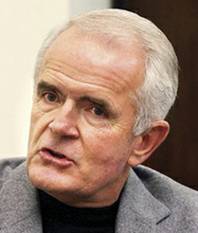Saturday, Dec. 19, 2009 | 2 a.m.

Gov. Jim Gibbons
U.S. Education Secretary Arne Duncan called Gov. Jim Gibbons on Dec. 8 to express concern that a Nevada statute is blocking the state from qualifying for as much as $175 million in grants for public schools.
To compete for money, states must allow the use of student test scores in teacher evaluations. During a special legislative session in 2003, Nevada lawmakers passed a last-minute bill that prohibited using test data in the evaluations.
As a result, it appears Nevada will be unable to meet the Jan. 19 deadline to apply for the first round of funding in the “Race to the Top” grant competition.
When the education secretary called, Gibbons was in a state Board of Finance meeting, so his Deputy Chief of Staff Stacey Woodbury spoke with Duncan. On Thursday, Woodbury told the Legislative Committee on Education that she assured Duncan a special session of the Legislature would be called, and the law would be changed in time to meet the June deadline for the second round of grants.
The committee voted to approve preliminary bill language to remove the prohibition.
Woodbury said she told Duncan a proposal is being floated that would make the teacher evaluation process subject to collective bargaining by individual school districts. The Nevada State Education Association has been working on a bill draft in advance of the special session. Some school districts oppose this, as it could make it more difficult to discipline teachers.
Duncan responded that such language wasn’t optimal, Woodbury said.
For more clarity on the issue, Keith Rheault, Nevada’s superintendent of public instruction, pointed the Sun to the U.S. Education Department’s Web site and a list of frequently asked questions about “Race to the Top.”
The Web site states that to be eligible to compete for the grants, the barriers against using test data in teacher evaluations must be removed at the state level. However, before the federal dollars can be spent, states will have to work out agreements with union groups that allow student test data as components.
In fact, Rheault said, Nevada could actually earn extra points in the application process if union leaders sign a memorandum of understanding with local school districts, indicating their support for the state’s plan.
•••
Nevada State Education Association President Lynne Warne told the Sun her organization is looking forward to working with lawmakers and education officials on the “Race to the Top” application and supports the preliminary recommendation to change the statute.
“It’s a good start,” Warne said. “It provides some legal protection for educators in that test scores could not be used as the sole criterion in their evaluations or in any kind of disciplinary actions.”
She expressed disappointment that Nevada had missed the deadline to qualify for the first round of funding, a situation Warne suggested might have been avoided had the governor moved quickly to call a special session.
•••
During conferences with parents this week, teacher Debby McWilliams, who works with gifted students at Heckethorn Elementary, heard one question again and again: Which middle school would offer their children the most challenging environment?
The Clark County School District spends about $8 million annually on Gifted and Talented Education classes — totaling 260 instructional minutes per week — for more than 5,500 students in grades 3-5. But the program was eliminated at the middle schools as a cost-saving measure in 2003 and never restored.
McWilliams says she tells parents about the district’s magnet middle schools, which can provide a more enriched (and sometimes accelerated) learning environment. But that’s not the same thing as GATE, which focuses on cultivating the intellectual curiosity and comprehension skills of gifted students.
“I know parents are surprised and disappointed when I tell them GATE ends after fifth grade,” McWilliams said. “It would be wonderful to see it restored (at the middle schools).”
A new $600,000 federal appropriation, secured by Senate Majority Leader Harry Reid and Democratic Reps. Shelley Berkley and Dina Titus, will help the School District move forward with plans to start an academy for highly gifted students.


Join the Discussion:
Check this out for a full explanation of our conversion to the LiveFyre commenting system and instructions on how to sign up for an account.
Full comments policy